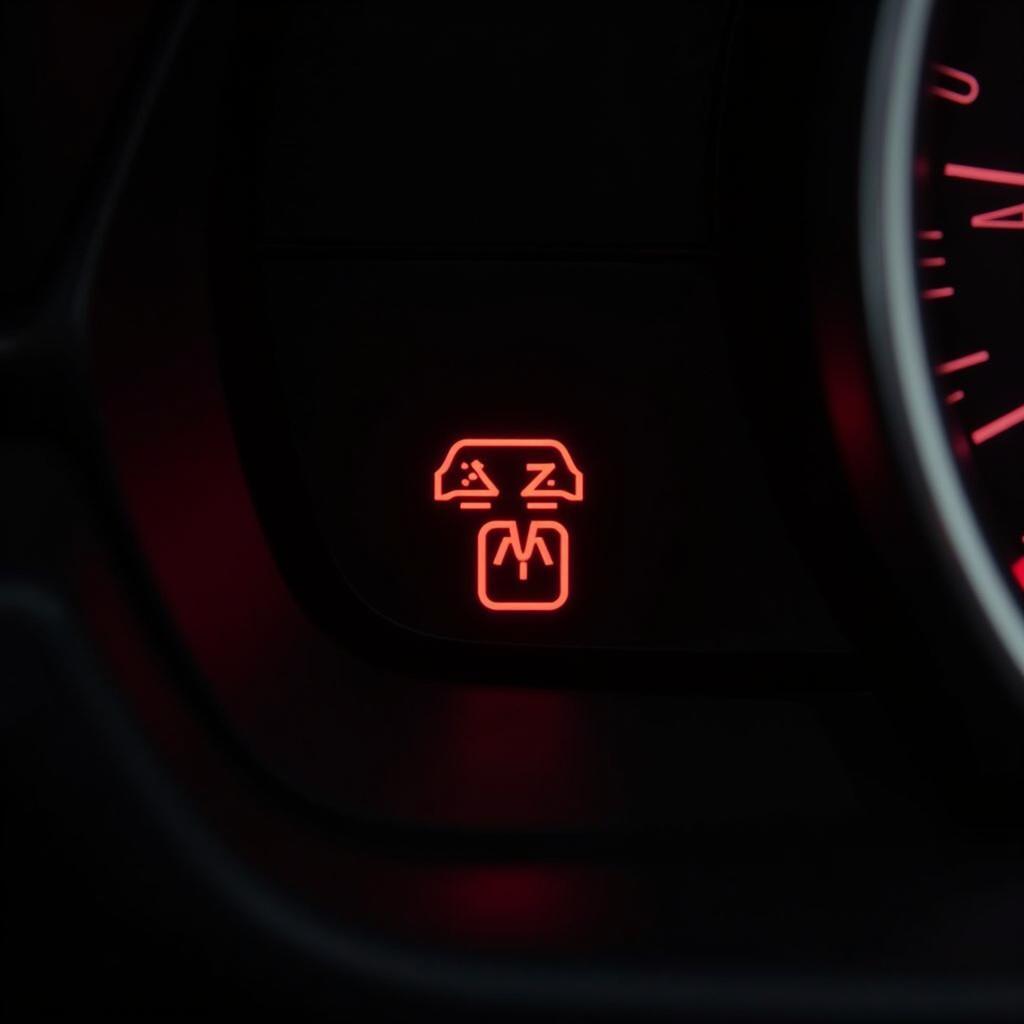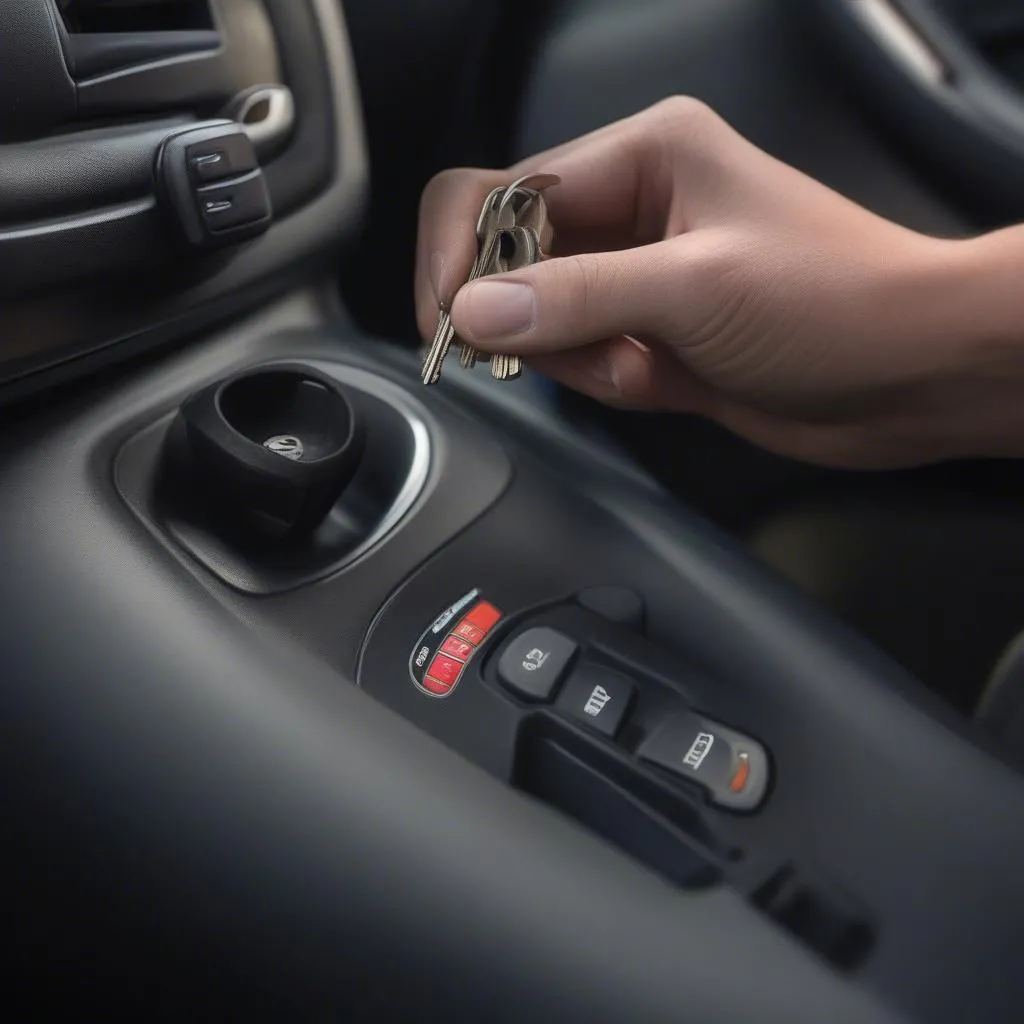Experiencing an Audi A3 brake failure warning can be a terrifying experience. This warning light signals a potential problem with your braking system, requiring immediate attention. This article will delve into the common causes of an Audi A3 brake failure warning, diagnostic procedures, and solutions, empowering you to address this crucial safety concern.
The brake failure warning light, often accompanied by a chime or message on the dashboard, indicates a fault within the braking system. Ignoring this warning could lead to reduced braking performance or even complete brake failure, putting you and other road users at serious risk. It’s crucial to understand why this warning appears and how to rectify the underlying issue. Let’s explore the potential culprits behind this alarming signal. After reading about low brake fluid levels, you may be interested in our article about the Audi A3 brake fluid warning light. audi a3 brake fluid warning light
Understanding the Audi A3 Brake Warning System
The Audi A3’s brake warning system is a complex network of sensors and components designed to alert you to any potential problems. Understanding how this system functions can help you pinpoint the root cause of the brake failure warning. Key components include the brake fluid level sensor, brake pad wear sensors, ABS sensors, and the brake pressure warning switch. These components work together to monitor various aspects of your braking system, ensuring optimal performance and safety.
 Audi A3 Brake Warning Light on Dashboard
Audi A3 Brake Warning Light on Dashboard
Common Causes of Audi A3 Brake Failure Warning
Several issues can trigger the brake failure warning light in your Audi A3. Low brake fluid is a common culprit, often indicating worn brake pads or a leak in the brake system. A faulty brake pressure warning switch can also trigger the warning, even if there’s no actual problem with the brake fluid level. Other potential causes include malfunctioning ABS sensors, worn brake pads, and issues with the brake booster or master cylinder.
Diagnosing the Problem
Diagnosing the cause of the brake failure warning requires a systematic approach. Start by checking your brake fluid level. If it’s low, top it off and monitor for further leaks. If the fluid level drops again quickly, you likely have a leak that needs professional attention. If you suspect your brake pads are worn, you can check them visually through the wheel spokes or have them inspected by a mechanic. A diagnostic scan tool can help identify faults within the ABS system and other electronic components. If you’re comfortable with basic car maintenance, you can also check the brake pressure warning switch connector for any signs of damage or corrosion. However, for more complex issues, seeking professional help is highly recommended.
For instance, if you’re noticing a grinding noise when braking, it might point towards worn brake pads. Read more about it on our dedicated page about A3 brake pad warnings. a3 brake pad warning
Solutions and Repairs
The solution to your Audi A3 brake failure warning depends on the underlying cause. Low brake fluid can often be resolved by simply adding more fluid and addressing any leaks. Worn brake pads require replacement, which can be done by a mechanic or if you have the necessary skills and tools, by yourself. Faulty sensors or switches need to be replaced, while issues with the brake booster or master cylinder often require more extensive repairs.
“Regular brake system maintenance is key to preventing many of these issues,” advises John Smith, Senior Automotive Technician at German Auto Experts. “Annual brake inspections can help identify potential problems early on, preventing costly repairs and ensuring optimal safety.”
If you suspect a problem with the brake pressure warning switch connector, consult our dedicated article for more information. brake pressure warning switch connector
Remote Diagnostics and Software Solutions
In some cases, the brake failure warning might be triggered by a software glitch. Remote diagnostics and software updates can often resolve these issues without requiring physical repairs. This involves connecting your Audi A3 to a diagnostic tool that communicates with the vehicle’s onboard computer, allowing technicians to identify and rectify software-related problems remotely. This can save time and money, especially for issues that don’t require physical component replacement.
You might find our resources on Audi A3 ABS and brake pad warning lights helpful in understanding more specific braking system issues. audi a3 abs brake warning light audi a3 brake pad warning light
Conclusion
The Audi A3 brake failure warning is a serious signal that should never be ignored. By understanding the potential causes, diagnostic procedures, and available solutions, you can address this crucial safety concern promptly and effectively. While some issues can be resolved with simple maintenance, others require professional intervention. Remember, prioritizing your braking system’s health ensures your safety and the safety of others on the road. Don’t hesitate to seek professional help when dealing with complex brake issues, and regular maintenance can help prevent future problems and ensure optimal braking performance in your Audi A3.



